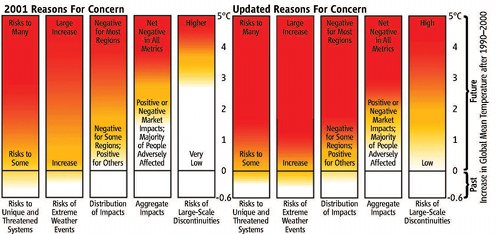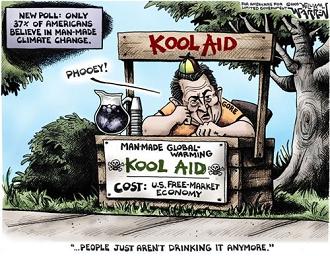Global Warming Fatigue Spreads
Doug L. Hoffman
In the run up to Copenhagen, global warming alarmists are spreading the word that climate change is progressing even faster than the IPCC has projected. But contradictory data from skeptics and open minded scientists continues to indicate that global warming has gone on hiatus and may not return for decades. This has sparked a noticeable drop in public concern over climate change and has led some climate change true believers to bemoan increasing public “Climate Fatigue.”
“We are basically looking now at a future climate that is beyond anything that we've considered seriously,” ecologist and IPCC author Christopher Field of Stanford University in Palo Alto, California, said in February at the annual meeting of the American Association for the Advancement of Science (AAAS). In March, a meeting of 2000 climate scientists in Copenhagen prompted the headline “Projections of Climate Change Go From Bad to Worse, Scientists Report.”
A news focus article in the November 13 issue of Science, written by Richard A. Kerr, starts off the IPCC propagandist party line by outlining the usual cornucopia of climate induced afflictions:
Climate news seems to have been all bad since the Nobel Prize–winning Intergovernmental Panel on Climate Change (IPCC) came out with its fourth assessment in February 2007. Within months of the sober but disquieting report, Arctic summer sea ice coverage plunged to a dramatic new record low, prompting talk about catastrophic tipping points. Glaciologists watched as record meltwater on the Greenland ice plunged into chasms, slicking the bottoms of glaciers and sending them racing to the sea. Swelled by glacier losses both north and south, the sea had been rising as fast as IPCC's worst-case scenario predicted, researchers reported. Lacking ice to hunt on, gaunt polar bears roamed Arctic lands in search of food. And newly crunched numbers showed that greenhouse gas emissions had shot up in the previous 5 years to exceed IPCC's worst scenarios.
Never mind that most of these “facts” have been contradicted in the reviewed scientific literature and the press, the climate change Cassandra's are turning up the volume on their doomsday pronouncements. Why? They know that they are loosing the argument scientifically and the battle for the hearts and minds of the public. The response among the climate change true believers has been to claim the IPCC's predictions are coming true even faster than expected and that mankind is hurtling towards disaster. In an attempt to bolster the IPCC claims, the United Nations Environment Programme (UNEP) issued an IPCC-like report that tries to inflate the potential for ecological damage.
The UNEP report entitled Climate Change Science Compendium 2009 presents the UN's latest case for heightened climate concerns. By its own admission, this is not an exhaustively peer-reviewed consensus assessment, but UNEP did compile its report “in association with scientists around the world.” Naturally, the UNEP update finds more sobering, even scarier, climate changes under way than IPCC did. To document its findings a new “burning embers diagram” was issued by 15 climate scientists, including some of the 2001 IPCC authors, in a March 2009 paper in the Proceedings of the National Academy of Sciences (PNAS).

[The red denoting high risk has crept down to smaller warmings since 2001. Source: J. B. Smith et al. PNAS.] The prime driver of global warming, emissions of carbon dioxide from burning fossil fuel, surged between 2000 and 2006, the report notes. That spurt has already contributed to a host of sooner-than-expected climate impacts, it continues, including “faster sea-level rise, ocean acidification, melting of Arctic sea-ice cover, warming of polar land masses, freshening in ocean currents, and shifts in circulation patterns in the atmosphere and the oceans.”
But even Kerr admits that this view is not universally held within the climate change community. Other scientists say the picture since the IPCC report is more complicated than that. “Things are looking much worse than was thought in the 1970s and '80s,” says Stanford University climate scientist Stephen Schneider. “But ‘much worse than IPCC 2007’ is only true for a few things.” Oh really? Still others add that some anticipated climate changes are actually behind schedule while a few are trying to stay the course. According to Vicky Pope, the UK Meteorological Office's head of climate change advice “It's at least as bad as expected,” she says. “I don't think it's worse.”
The Met Office Hadley Centre, perhaps in an attempt to atone for having to report the past decade's halt in temperature rise, has recently announced a new “tipping point.” The Met Office has declared that the world has only ten years to control global warming or a whole litany of woes will afflict the peoples of Earth. Perhaps an indication of how desperate the climate change crowd is becoming is the warming that certain countries would lose their national dishes. According to the Met study's models, a low durum wheat yield in Italy could make pasta more expensive while in Poland potato crops are under threat. That's right, scare people into cutting CO2 emissions by threatening their favorite food—real science at work.
“Whether or not the public is hearing the right tone of voice from the right places, it doesn't seem to be getting the message anymore,” opines Kerr. Recent polls suggest that US citizens are notably less concerned about global warming than they were a few years ago. In a poll conducted at the end of September by the Pew Research Center for the People and the Press, the proportion of Americans who “think there is solid evidence that the average temperature on earth has been getting warmer over the past few decades” dropped to 57% from 71% in April 2008. The proportion of the American public that views global warming as a very serious or somewhat serious problem dropped from 73% to 65%. And in a Gallup poll released in March, the proportion of Americans who believe that the seriousness of global warming is exaggerated hit 41%, a record high in the 12 years Gallup has asked that question.

[Gallup polls suggest hard times for climate change activists. Source: Gallup Inc.] Nor is this trend limited to America. According to The Economist, public opinion in Europe, where attitudes are generally greener than in America, has also soured on climate change. A poll published in July by the European Commission showed that early in 2009, the number of European Union residents who saw climate change as the world’s gravest problem had dropped to 50% from 62% in spring of 2008. That was partly because the numbers citing global recession as the main worry had surged from 24% to 52%.
In Australia, a more fundamental shift towards skepticism seems to be occurring, despite the Labor government’s efforts to push the country in a greener direction. A poll in July by the Lowy Institute showed the number of Australians willing to shoulder “significant costs” to tackle global warming had fallen to 48%. This is down from 60% last year and 68% in 2006. In both America and Australia the public seems to be growing more doubtful, even in the face of ever shriller warnings from the IPCC and its minions.
“Where do you go after ‘unequivocal’?” asks Roger Pielke Jr., a science policy scholar at the University of Colorado, a reference to the measure of certainty the IPCC applied to its core findings in its 2007 report. By sounding the alarm too loudly, Pielke and others say, climate change campaigners could be causing the public to tune them out or could even provoke a backlash. Indeed, where do you go? Like a compulsive gambler doubling down on a bad hand, the climate change extremists continue to bet on their visions of pending disaster. It looks like the IPCC, the UN agency that cried “wolf” over climate change, is about to discover the consequences trying to deceive the world.
Be safe, enjoy the interglacial and stay skeptical.

__________________________________________________________________________________
Source: http://www.theresilientearth.com/?q=content/global-warming-fatigue-spreads

























